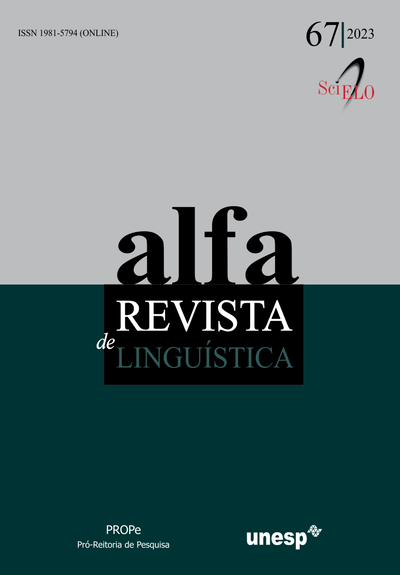Linguagem inclusiva em contexto didático-digital
uma análise de ideologias linguísticas em videoaula e comentários on-line
DOI:
https://doi.org/10.1590/1981-5794-e17251Palavras-chave:
linguagem inclusiva, contexto didático-digital, ideologias linguísticasResumo
Este artigo objetiva identificar e analisar ideologia linguística subjacente ao tratamento teórico concedido à linguagem inclusiva em contexto didático-digital (videoaula e comentários on-line) de Língua Portuguesa, a partir de perspectivas teóricas da Linguística Antropológica (Irvine; Gal, 2000; Kroskrity, 2004), de teorias queer (Butler, 2003; Pinto, 2014) e da Linguística (Câmara Jr., 1970; Castilho; Elias, 2015). A justificativa desse estudo está no enfoque em contextos didático-digitais de larga audiência, enquanto espaços para difusão e embate de ideologias linguísticas que regulam publicamente a língua, tornando relevante a discussão empreendida. O contexto didático-digital pesquisado se dá pela publicação de videoaulas sobre linguagem inclusiva através do canal Português com Letícia, no YouTube. Considerando que os objetos empíricos estão inseridos na virtualidade com registros textuais e audiovisuais, a investigação é documental sob inspiração netnográfica. Os resultados apontam a existência de confronto entre ideologias linguísticas, uma em favor da linguagem inclusiva, outra apoiada numa perspectiva conservadora para o tratamento da língua. O embate entre ambas é tensionado por uma ordem prescritivista que anula variedades possíveis nos usos linguísticos para fins comunicativos e inclusivos, tomando como base percepções enraizadas e naturalizadas na mentalidade do senso do comum, desde a formulação dos ideais do colonialismo.
Downloads
Downloads
Publicado
Como Citar
Edição
Seção
Licença
Copyright (c) 2023 ALFA: Revista de Linguística

Este trabalho está licenciado sob uma licença Creative Commons Attribution 4.0 International License.
Os manuscritos aceitos e publicados são de propriedade da Alfa: Revista de Linguística. É vedada a submissão integral ou parcial do manuscrito a qualquer outro periódico. A responsabilidade do conteúdo dos artigos é exclusiva dos autores. É vedada a tradução para outro idioma sem a autorização escrita do Editor ouvida a Comissão Editorial.

